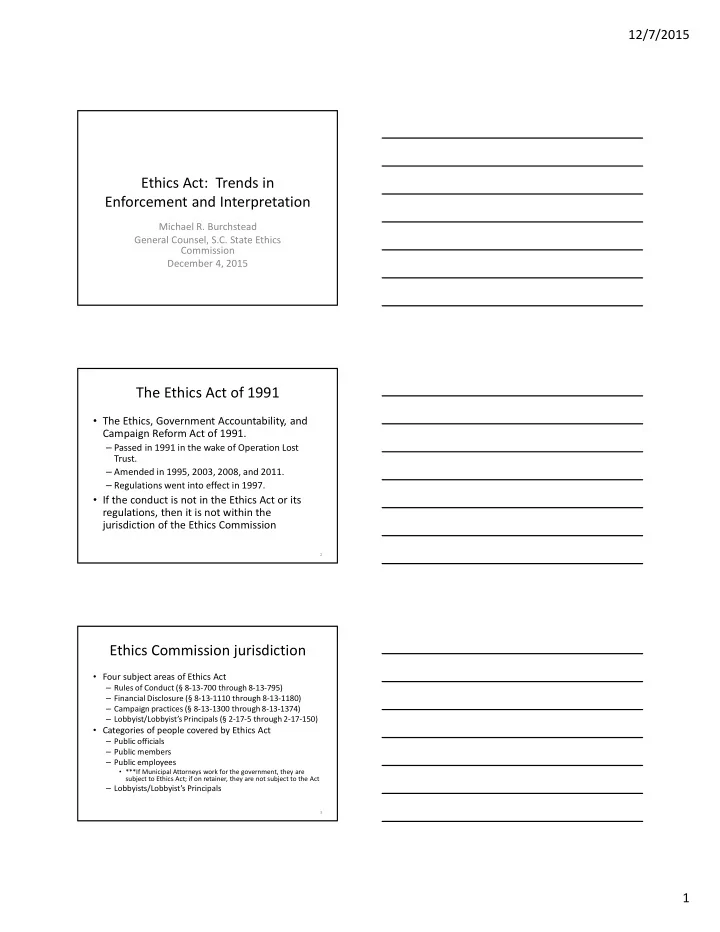

12/7/2015 Ethics Act: Trends in Enforcement and Interpretation Michael R. Burchstead General Counsel, S.C. State Ethics Commission December 4, 2015 The Ethics Act of 1991 • The Ethics, Government Accountability, and Campaign Reform Act of 1991. – Passed in 1991 in the wake of Operation Lost Trust. – Amended in 1995, 2003, 2008, and 2011. – Regulations went into effect in 1997. • If the conduct is not in the Ethics Act or its regulations, then it is not within the jurisdiction of the Ethics Commission 2 Ethics Commission jurisdiction • Four subject areas of Ethics Act – Rules of Conduct (§ 8-13-700 through 8-13-795) – Financial Disclosure (§ 8-13-1110 through 8-13-1180) – Campaign practices (§ 8-13-1300 through 8-13-1374) – Lobbyist/Lobbyist’s Principals (§ 2-17-5 through 2-17-150) • Categories of people covered by Ethics Act – Public officials – Public members – Public employees • ***If Municipal Attorneys work for the government, they are subject to Ethics Act; if on retainer, they are not subject to the Act – Lobbyists/Lobbyist’s Principals 3 1
12/7/2015 Legislative Update on Ethics Some key provisions of what was proposed early in the year: • Amended Section 8-13-1120 regarding contents of statement of economic interests to – include additional private sources of income. • Presently, income derived from government entities needs to be disclosed, but this change adds specified private income. Gave the Ethics Commission jurisdiction over members of the General Assembly. – • Presently, oversight of General Assembly handled by House and Senate Ethics Committees. This is perceived as a conflict of interest. Multiple provisions related to Political Action Committees and campaign practices – • A federal court several years ago declared the South Carolina definition of “committee” to be unconstitutional, so the Ethics Commission hasn’t been regulating them since then. Reconstituted the Ethics Commission – • Presently 9 members, appointed by the Governor with advice and consent of the General Assembly. • The bills may vary somewhat, but different versions allow some combination of the House, Senate, Governor, judiciary the ability to appoint 9 or more members. 4 COMPLAINTS AND CONFIDENTIALITY Complaint Flow Chart 6 2
12/7/2015 Probable Cause Determination • No probable cause – Public – Order of Dismissal issued • Probable cause finding – Public – Next step: Notice of Hearing, Hearing Date Set, Consent Order Option – Another option: find probable cause and waive further proceedings • Section 8-13-320(i): “If the commission finds probable cause to believe that a violation of this chapter has occurred, the commission may waive further proceedings if the respondent takes action to remedy or correct the alleged violation Confidentiality • S.C. Code Ann. 8-13-320(10)(g): – All investigations, inquiries, hearings, and accompanying documents must remain confidential until a finding of probable cause or dismissal unless the respondent waives the right to confidentiality. The wilful release of confidential information is a misdemeanor, and any person releasing confidential information, upon conviction, must be fined not more than one thousand dollars or imprisoned not more than one year. Confidentiality • S.C. Code Ann. Regs. 52-718 (A) No person associated with a complaint…shall mention the existence of the proceedings or disclose any information pertaining thereto except to persons directly involved including witness and potential witnesses, and then only to the extent necessary for investigation and disposition of the complaint. Witnesses and potential witnesses shall be bound by these confidentiality provisions. (B)The Respondent may waive the confidentiality of the proceeding in writing filed with the Commission. 3
12/7/2015 Confidentiality Scenario • Complainant send letter to the Ethics Commission Executive Director and the media outlining ethics violations against a public official. • Several days later, the Ethics Commission formally opens a complaint. • A reporter calls several days later to inquire about the status of the ethics complaint… • A truthful answer: “Yes, there is a Complaint,” does that violate confidentiality? • YES Confidentiality (continued) • After a complaint is filed, until probable cause is found, neither Complainant nor Respondent may discuss existence of complaint. • Respondent may waive confidentiality, but the waiver has to be in writing to the Commission • Ethics Commission may find violation against Complainant, Respondent, or other persons for violation of confidentiality. Ethics Commission Opinions on Confidentiality • Confidentiality attaches upon receipt of the complaint letter by the State Ethics Commission – SEC AO2002-010 (Mar 20, 2002) • Confidentiality waiver must be in writing – SEC AO2000-06 (Jan 19, 2000) – In order to properly waive confidentiality, the Respondent must forward written notice of his waiver to the State Ethics Commission prior to commenting. – “Clearly the confidentiality provision are in place to protect the Respondent; however, when the Respondent waives such confidentiality without written notice, the Commission and the Complainant are prevented in commenting on the complaint.” 4
12/7/2015 Ethics Commission Opinions on Confidentiality • A councilmember with an ethics violation against him can discuss his legal defense in executive session without violating confidentiality – SEC AO92-130 (June 9, 1992) – In executive session, the council member can advise other members of the fact of the complaint without disclosing materials facts or allegations contained therein. – The Council could then go into open session to vote on a motion to provide legal counsel, without disclosing facts or allegation or that it is an Ethics Commission complaint. CONFLICTS OF INTEREST AND OTHER RULES OF CONDUCT ISSUES Conflicts of Interests– 700A • Section 8-13-700(A) – “No public official, public member, or public employee may knowingly use his official office, membership, or employment to obtain an economic interest for himself, a family member , an individual with whom he is associated , or a business with which he is associated .” – Exception for incidental use not resulting in additional public expense. 15 5
Recommend
More recommend